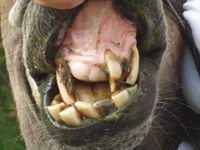Dental Disease (Geriatric) - Donkey

Oral examination is vital. A full mouth speculum and light source is essential. Space is limited in many donkeys’ mouths and there is an absolute need to feel, if not actually see, the caudal molars. Even experienced donkey clinicians are surprised at how much condition an animal can maintain despite the most appalling teeth. However, caudal molars, loose teeth, oral infections and generally poor oral conformation can still cause acute problems and need to be monitored. The clinician should also be aware that age-related incisor wear can differ in donkeys to that of other equines.
However, a word of warning must be expressed at this juncture: many vets and equine dental technicians who are used to dealing with performance or riding horses are keen to do radical work on a donkey that has been newly presented to them. It is best to remember that, in general, donkeys need their teeth to be comfortable, free from infection and in the best position to extrude the most nourishment as possible from their feed, never more so than during the later years.
Heroic dental work and the aged donkey rarely mix: to lose an animal from anorexia and subsequent hyperlipaemia following extensive dental treatment is always heartbreaking for all concerned. Clinicians must always be urged to act on the side of caution and small amounts of work at regular intervals should be the recommendation given to the owner.
It is a common mistake to automatically assume, when presented with an ailing aged donkey with poor dental conformation, that this is the primary source of the problem. Therefore, always suspect other pathologies if sudden weight loss or illness develops in individuals with chronic dental disease. It is also a wise precaution to consider taking a routine blood sample prior to any significant dental work and to adjust standard sedative regimes in elderly, cachexic animals.
References
- Sprayson, T. (2008) The care of the geriatric donkey In Svendsen, E.D., Duncan, J. and Hadrill, D. (2008) The Professional Handbook of the Donkey, 4th edition, Whittet Books, Chapter 13
Fact Sheet
Donkey Dental Care for Vets and Equine Dental Technicians
|
|
This section was sponsored and content provided by THE DONKEY SANCTUARY |
|---|